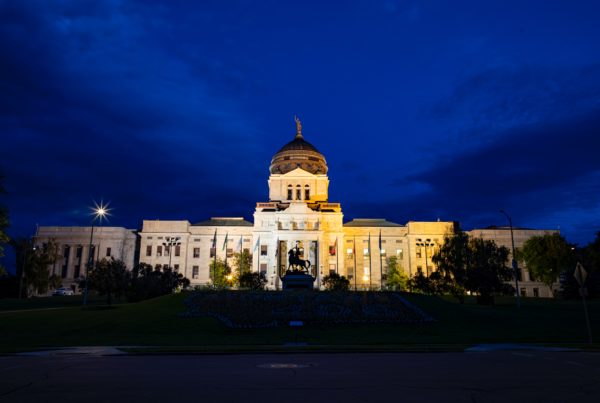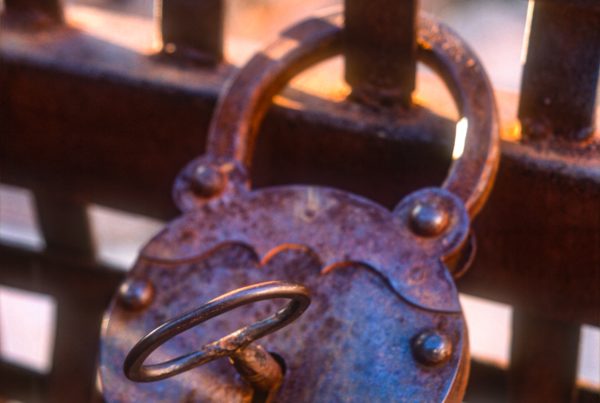Dying At 147
Joseph discovers his father, at age 147, is finally dying and brings his two sons to Jacob’s deathbed. This chapter and the next is his long goodbye.
Seeing Joseph is life giving, so Jacob finds the strength to sit up in bed. Hebrews 11:21 records him worshipping with his dying breath, “By faith Jacob, when dying, blessed each of the sons of Joseph, bowing in worship over the head of his staff.”
Til the end, Jacob clings to God’s vision for his life and family. He’s living in Goshen with reasonable comfort but knows where his true home and prosperity lie. His eyes are dim but his faith and memory are strong. God appeared to him twice as a young man (Genesis 28:10, 35: 6), in a place called Luz which he renamed Bethel, and imparted the same vision given to his fathers, Abraham and Issac. God declared to his father, a vision clearly understood for all time as land, seed, and blessing, and also one found in the beginning of Genesis, to be fruitful and multiply. He has been walking toward that vision his whole life, and now shares his testimony (v.2-7) about how heartbreaking it was to lose Rachel just before arriving in their new home.
Adoption And Blessing
Jacob is no fool, he knows exactly what he is doing, telling Joseph I am adopting your sons and transferring Rueben’s birthright to them. Rueben’s corruption removed his birthright (I Chronicles 5:8). “Your two Egyptian born sons are mine,” he said, then mentions each son by name. The two young men are no longer his grandsons, nor citizens of Egypt, they are now Hebrew sons of promise, and receiptents in full of his blessings. None one save God has any authority to stop this action, which will marginalize Rueben and to some degree the others, and allow Ephraim’s descendents to inherit all of northern Israel (I Kings 12:19,25).
The young men are in their twenties, but Jacob’s age and age-related blindness make him ask Joseph to identify the young men, but it is almost certain he is toying with his favored grandsons. Who are these?” the Patriarch asks. “These are my sons God gave me here,” Joseph responds. “Bring them to me that I may bless them.”
With deep tenderness we are allowed to hear Jacob’s thoughts, “I never expected to see your face, let alone your sons” he says, speaking of Joseph.
Joseph lives in a nice house in an urban setting, Jacob lives in a tent on the waterfront, so his bed is a mat on the ground.
Joseph kneeling before his father is practical and honorable, bowing to the ground toward his father is an act of love.
Cross Blessing
Due to Joseph not wanting the birthright transferred to the youngest, there are now two blessings given.
The oldest son (Manasseh) is directly in front of Jacob’s right hand, and the youngest (Ephraim) is directly in front of his left. Joseph intentionally placed them like this before his father, that would be the natural order of things, but God has something supernatural in mind, so Jacob crosses his hands, placing his right hand on the youngest (Ephraim), and his left hand on the oldest (Manasseh).
The First Blessing
The words Jacob spoke are not addresed directly to the Ephraim, it’s that he took his right hand, the symbol of authority, and cross placed it on Ephraim. Both boys received a blessing, as Jacob clarified to Joseph. “I know, my son, I know. he also shall become a people, and he also shall be great. Nevertheless, his younger brother shall be greater than he, and his offspring shall become a multitude of nations.” (Genesis 48:19)
In the blessing Ephraim and Manasseh learn about God’s character. Earlier in his conversation with Joseph, a conversation the young men heard, Jacob mentions God is El Shaddai, God Almighty. As he blesses the young men, he reveals God is also Elohim, the one and only ruler of the universe, that single ruling God is the one now at work, and not just at work but feeding and tending him like a shepherd, with Jacob emphasizing “all my life.”
In the blessing Jacob also mentions “the angel who redeemed me from all evil.” The angel is a reference to the Lord and the dream found in Genesis 28:15, but the word redeemed is the Hebrew word gaal, most know it as goel, and is found for the first time in scripture here. The goel is the kinsman redeemer, a distant relative capable and willing to save one who is lost. Seen romantically in the book of Ruth, it is theologically discussed in depth in the book of Romans.
The Second Blessing
Jacob has no political or worldly power, yet he claims Israel, once settled back in the land, will name his two grandson as examples of God’s gracisous and sovereign blessings.
Blessing Joseph
The place Jacob had in mind is Shechem. Joseph was taken into slavery by then, but his brothers murdered in cold blood, vengeful actions Jacob was working to avoid. He legally bought the land as seen in Genesis 33:19, but the purchase came with threats of violence and a violent outbreak, and now he gifts it to Joseph. At the end of Josephs’ life he would make the “sons of Israel swear to take his bones during the Exodus,” (Genesis 50:25). Joshua ensured Joseph’s bones were buried in Shechem, the land bought by Jacob, territory that was then in the land of Ephraim (Joshua 24:32).





